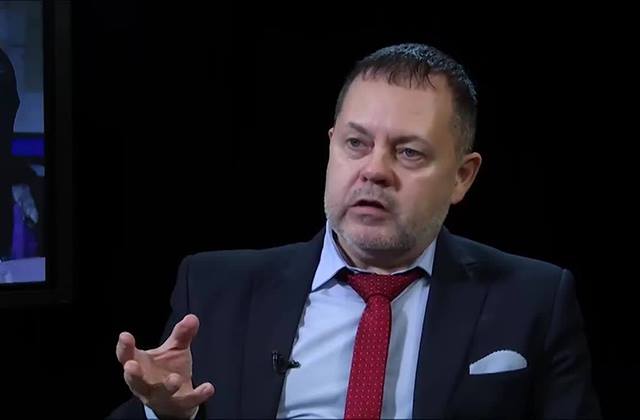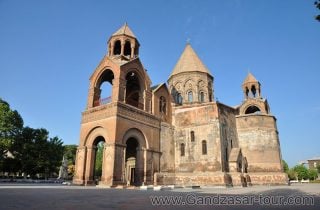“Either Return of Karabakh and its Adjacent Lands, or Preparation for War—Armenia has no other choice”

Interview with Grigory Trofimchuk, foreign affairs, security and defense analyst.
Mr. Trofimchuk, after the four-day April war instigated in Karabakh, the OSCE MG Co-chairs succeeded to organize Aliyev-Sargsyan meeting with the participation of the Ministers of Foreign Affairs. On account of recent dynamics of Russia-West relations, in your opinion, what’s going on around the conflict settlement process, and what should we expect from this meeting?
After the Vienna meeting, gradual extension of influence of the West, in particular, of the USA in the conflict settlement, or more exactly of war settlement process, should be anticipated. One shouldn’t forget that it was the USA that initiated this meeting. However, Washington and Moscow pursue exclusively different purposes and apply different methods within the management of this issue. One should clearly understand that before the West there is no issue of returning Karabakh under the patronage of this or that state, however, there is a desire to obtain an independent political leverage from that enclave, on account of which the situation may be settled not only in the South Caucasus, but in the whole Caspian and Black Sea Basin.
Naturally, this is not being outspoken, however, it’s presupposed in case when it’s easily practicable, as Armenia and Azerbaijan won’t go to any compromise. Armenia theoretically may go to a compromise, however, prior to the April events. Currently it’ll be observed only as withdrawal of Armenian territories, and not in any other way. Russia has assumed responsibilities after the April 5 ceasefire. However, it’s not occurring yet, which deepens the situation, as it has already passed the “freezing” point and will never be returned to that condition. It won’t return for the simple reason, that as a result of fighting lots of casualties, economic losses and damage have been recorded. This should be assessed and “hung” on somebody. Supposedly, OSCE MG will work on it.
What’s your assessment to Russia’s positions, which, according to some allegations, are weakening in the settlement process, which you have touched upon?
As I have already mentioned, Russia has lost necessary temp, by assuming serious responsibilities towards Yerevan and Baku by words. By the way, for this reason Vienna meeting was launched in more than a month later, as Russia started to lose that temp. Azerbaijan hoped on the support by the West, which it doesn’t conceal. Maybe there is a purpose to initiate some clash between Moscow and Washington. However, it should have been anticipated, as “enclosing” of the settlement process in the same container marked with “1994” is impossible, one shouldn’t rely on it any more. Two new decades for negotiations won’t be recorded. Russia should have proposed its own settlement plan.
In your opinion, how did Armenia overcome the four-day war and which are its implications? Which steps should Armenia undertake?
Armenia didn’t overcome this “incomplete” war, as the situation on the contact line doesn’t precede occurrences of April 1. We can touch upon the fact that Azerbaijan has taken not only “several centimeters of land,” however, this very circumstance changes the whole issue. If the sides stood where they were previously standing, negotiations would have bene accomplished. However, presently, in fact, Azerbaijan approached more to Armenia and announced on its claims. Out of this I may anticipate Azerbaijan’s further progress. Naturally, Armenia will have to show sharp confrontation, however, it’ll be a wide-scale war. They didn’t leave much choice to Armenia—either follow the “road map” of negotiations, withdrawing Karabakh and adjacent lands in a clear-cut deadlines, or get prepared for the new war. However, exits are found from any situation, and they are available here as well. And this is creation of a common trust zone in the Caucasus, as simple, mechanical return to the Soviet internal borders is no more possible. Meanwhile, for such formulation of the issue it’s necessary to change all the tools and the participants, engaged with the conflict settlement process through recent decades. Opinions of social figures from countries like Georgia should be taken into consideration as well. Moreover, when Azerbaijan also publicly states its discontent on OSCE MG format. However, it’s just one part of the issue. I won’t touch upon the other part, as I’m not in OSCE MG. People are paid money for their proposals, let them work.
According to initial agreement, probably presidents of the two countries will meet in June. What should be anticipated from that meeting?
At best the fact of the meeting should be expected, and the fact that maybe a formal document will be signed during it observing development of means of trust. Not a single “Final document” will be signed, as such formulation will mean only one thing: implementation of phase-to-phase plan of returning lands adjacent to Karabakh, and return of Karabakh in itself. Everything will start just from Karabakh—first Karabakh, and then the other parts. On the whole, Armenia doesn’t need this, as the main issue hasn’t been clarified: who initiated the fighting? Let the OSCE MG provide its competent conclusion on this. And if not, it should be changed. Progress will start from this. The supposed venue has also its role. There are rumors, that it’ll be launched in Russia. And if it’s organized in Russia, it will be one of the meetings with the topic “let’s live in peace,” which will more instigate Azerbaijan. Thus, venue is a crucial and principal point in this regard. If Russia is going to organize the meeting on its territory, it should introduce an exclusively new agenda. In that case, everything will develop positively.
Russia-led policy, i.e. armaments sales to the conflicting states is being strictly criticized in Armenia, as the society realizes, that Russian armaments are applied against Armenia and Karabakh in case, when Armenia is a CSTO member country, which should provide Armenia’s security. These questions raise anti-Russian moods in Armenia. Isn’t Moscow bothered with this? Doesn’t Moscow intend to review that policy? Surely, we remember the statement by Rogozin, however, it’s interesting to know your opinion on this.
Moscow, unfortunately, isn’t worried with growth of anti-Russian moods in Armenia. Although experts have warned about this long ago. And the issue isn’t only Karabakh, it’s been circulated long ago, and here—murder of the family in Gyumri and likewise issues. Surely, the issue of Russian armaments supply both to Azerbaijan and Armenia is existent as well, however, Russia isn’t able to go beyond those frames, as it’s not ready to “split” between Yerevan and Baku, even on account of the fact that Yerevan in CSTO is Russia’s strategic partner and an ally within EEU. Everything can be settled in a simpler and different way: improving the life quality of Armenia’s citizen in those blocks, on account of Armenia’s membership. In that case people will observe the issue differently. However, improvement of life quality isn’t recorded, and there is outbreak of situation in Karabakh. All this just worsens the situation.
Russia faces a perennial crisis referring not only to economy, as other issues originate from it. Karabakh conflict could have been settled before the Ukrainian crisis. However, 2014 has changed a lot and this destabilization was reflected on the South Caucasus. Another variant for situation improvement may be proposals to Armenia and Azerbaijan by Russia, which will economically improve the situation in that country. Presently it’s impossible to form a “new union,” however, creation of a new security system, including the economic one, may be a real exit. However, big issues are available here as well, as by not isolating all the oligarchs in all the countries, it’s impossible to have a normally functioning economy. In other words, the money (or their absence, for which armaments is being sold to all the sides) decides everything.
By Araks Martirosyan

























